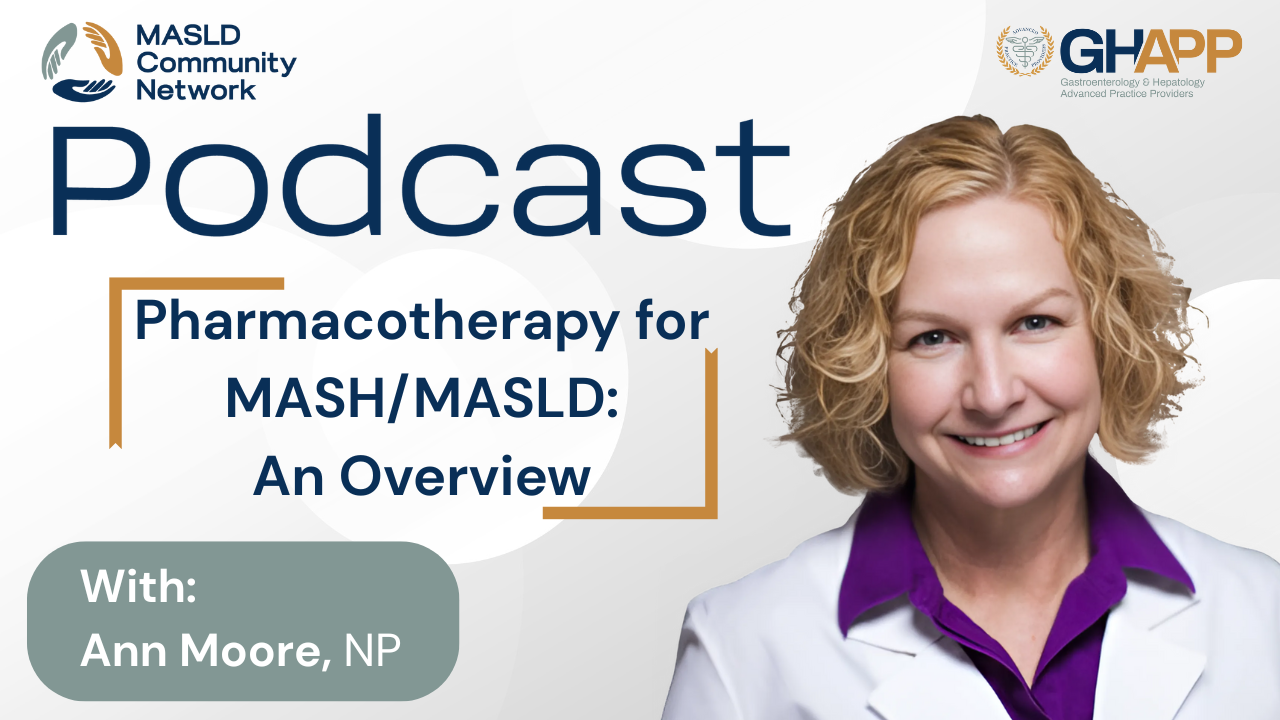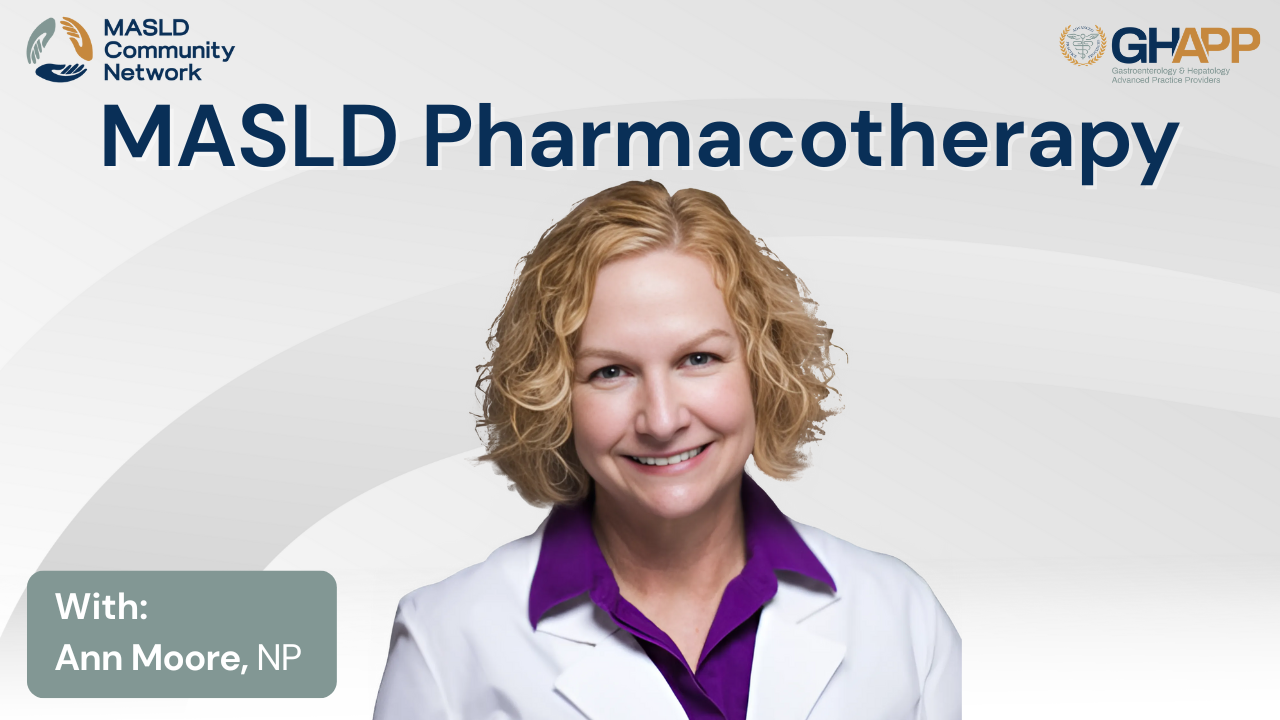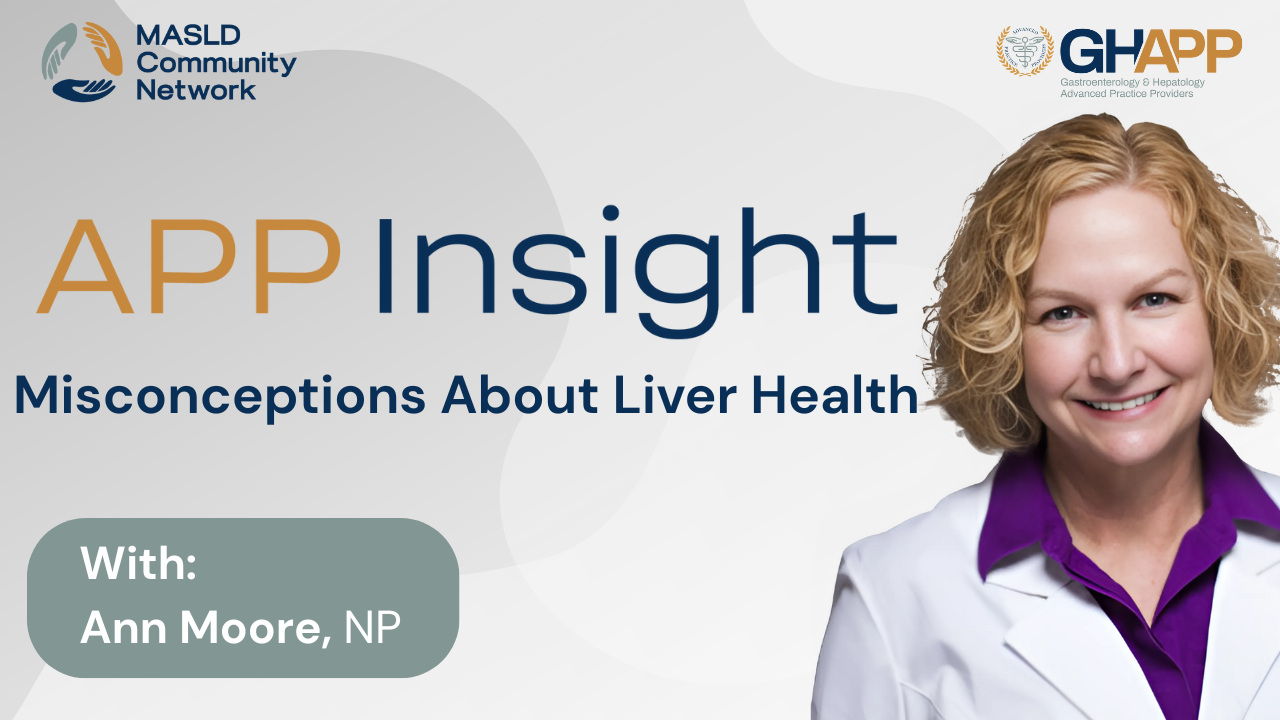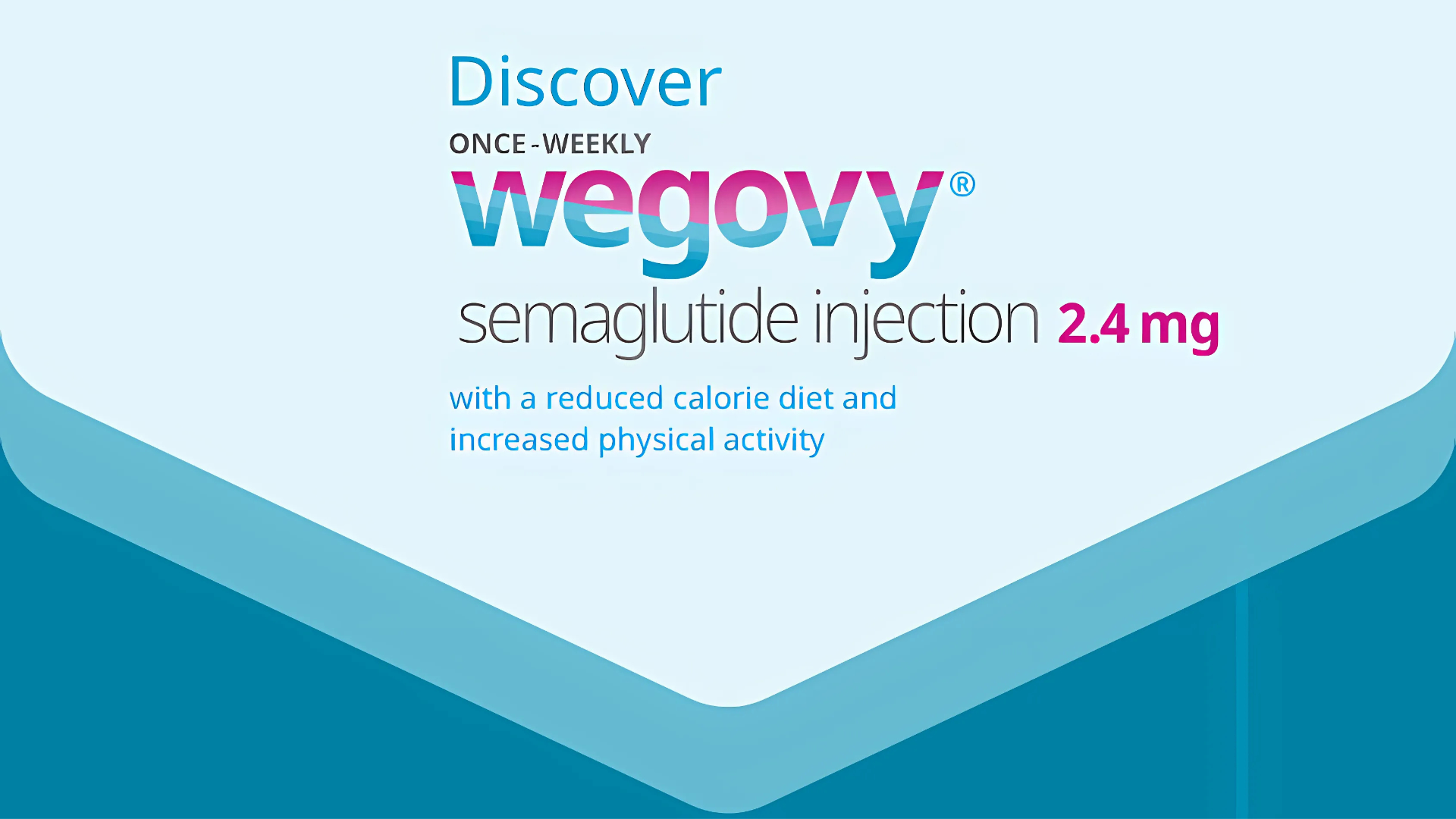
Ann Moore
NP
Location : Phoenix, AZ, USA
BIO
Ann Moore is a hepatology nurse practitioner and VP of Clinical Services at Arizona Liver Health. She has over 30 years of liver disease and liver transplant management experience and is recognized nationally for her liver disease expertise. In addition to her clinical practice, she serves as Principal Investigator for multiple clinical trials in MASH and other liver diseases. Throughout her career, Ann has worked to expand access to liver disease care throughout the state of Arizona, running numerous outreach clinics in rural locations.
MASLD-MASH Content Featuring Ann

Pharmacotherapy for MASH/MASLD: An Overview

In this expert discussion, Anne Moore, NP with Arizona Liver Health in Phoenix, shares key insights into the evolving landscape of pharmacotherapy for MASH and MASLD. She explains the primary histological endpoints that matter most in clinical trials—MASH resolution and fibrosis improvement—and why these markers are critical for both regulatory approval and long-term patient outcomes. Anne highlights the approval of resmetirom, the first FDA-approved treatment for MASH with F2–F3 fibrosis, and reviews how it works as a selective THR-beta agonist to reduce liver fat and inflammation while improving fibrosis. Drawing on Phase 3 trial data, she outlines its efficacy, safety profile, and side effects, as well as strategies for monitoring patients through non-invasive testing, liver chemistries, and metabolic risk factors. This session also explores which patients are most appropriate candidates for MASH pharmacotherapy, with a focus on those at high risk of progression but still early enough in their disease to benefit. For advanced practice providers and hepatology specialists, this video provides a clear, practical roadmap to identifying, treating, and monitoring patients with MASH in everyday clinical practice.
Watch Now

MASLD Pharmacotherapy With Ann Moore

Ann Moore, NP, Arizona Liver Health, delivers a practical overview of MASLD pharmacotherapy for the GHAPP MASLD Community Network, sponsored by Madrigal Pharmaceuticals. She covers the treatment toolbox—from lifestyle foundations (Mediterranean-style nutrition, sustainable weight loss, physical activity) and obesity/diabetes therapies (GLP-1 and GLP-1/GIP agents, bariatric surgery) to liver-directed options like vitamin E (in select non-diabetic patients), pioglitazone (for type 2 diabetes), and the THR-β agonist resmetirom for adults with non-cirrhotic MASH and F2–F3 fibrosis. You’ll learn when to stage with non-invasive tests (FibroScan®, ELF, MRI-PDFF), how to pair systemic and liver-targeted therapies, key safety and drug–drug considerations, and practical monitoring tips to keep patients on track. Ideal for APPs and GI/hepatology clinicians seeking an up-to-date, patient-centered roadmap to slow fibrosis and improve liver outcomes.
Watch Now

MASLD Basics With Ann Moore

In this episode of MASLD Basics, Ann Moore, NP with Arizona Liver Health, explains the new terminology and approach to what was once called fatty liver disease. She breaks down how “NAFLD” is being replaced with steatotic liver disease and how patients are now categorized based on underlying drivers such as metabolic dysfunction, alcohol use, or other conditions. Ann highlights why MASLD and MASH are the most common and important to recognize, what risk factors providers should look for, and why early detection matters. She also discusses how primary care teams can use simple non-invasive tests, lifestyle changes, and new treatment options to identify at-risk patients before fibrosis and cirrhosis develop. This talk is designed to give APPs, clinicians, and healthcare providers a clear, practical overview of the evolving landscape of liver disease care.
Watch Now

Misconceptions About Liver Health With Ann Moore

Join Ann Moore, NP from Arizona Liver Health as she tackles two of the biggest misconceptions in liver health. With over 40 years of experience, Ann explains why normal liver tests don’t always mean a healthy liver—patients with MASH and advanced fibrosis (F2–F3) can have “quiet labs” while disease silently progresses. She also dispels the outdated belief that only alcohol causes liver disease. With the new MASLD and MASH terminology, the focus is on metabolic dysfunction—including obesity, diabetes, and high cholesterol—as the main global drivers of fatty liver disease, not alcohol alone. This educational session is designed to help clinicians and patients alike understand why early detection and management of metabolic risk factors are essential for protecting long-term liver health. Stay connected with the MASLD & MASH Community Network for more expert insights and updates on fatty liver disease care.
Watch Now

Management of Life Style Modification

This video focuses on the comprehensive management of patients with metabolic-associated steatohepatitis (MASH), emphasizing lifestyle modifications, dietary adjustments, and exercise strategies. Key topics include the importance of addressing risk factors like diet, exercise habits, and alcohol intake, as well as referrals to medically supervised weight loss clinics or bariatric surgery for advanced cases. The speaker highlights the benefits of the Mediterranean diet, intermittent fasting, and avoiding ultra-processed foods while discussing the role of resistance training to combat sarcopenia and maintain muscle mass. Practical advice and tailored recommendations ensure a holistic approach to managing MASH and improving patient outcomes.
Watch Now

Third Step of Life Style Management

This video provides a comprehensive overview of emerging pharmacologic treatments for metabolic-associated steatohepatitis (MASH) and their tailored applications based on patient profiles. Topics include FDA-approved therapies, drugs in advanced clinical trials (such as semaglutide and lanifibranor), and the potential for combination treatments targeting both steatohepatitis and fibrosis. The speaker emphasizes the importance of patient-specific approaches considering metabolic profiles, obesity, and diabetes status, alongside lifestyle interventions. Additionally, the video discusses the evolving interdisciplinary care model and highlights the exciting progress in non-invasive testing and treatment advancements for F2-F3 fibrosis.
Watch Now

Approved Medication for MASH/NASH

This video provides detailed guidance on selecting and monitoring patients for emerging therapies targeting advanced fibrosis (F2-F3) in NASH. Key topics include contraindications for patients with cirrhosis, considerations for concomitant medications, and dose adjustments for statins. The video outlines ideal candidates based on specific thresholds for VCTE, MRE, ELF scores, and other non-invasive tests while emphasizing the importance of ruling out portal hypertension and other liver diseases. It also reviews a stepwise monitoring approach, focusing on tolerability at three months and efficacy assessments at six and twelve months, with an emphasis on histologic and non-invasive test improvements.
Watch Now

Types of Diet for the Treatment of MASLD

This video explores comprehensive strategies for managing metabolic-associated steatohepatitis (MASH), focusing on fibrosis risk stratification, lifestyle modifications, and pharmacologic interventions. Learn about dietary recommendations like the Mediterranean diet, exercise guidelines emphasizing resistance training, and the role of intermittent fasting and processed food avoidance. The video also highlights weight loss targets, diabetes management, and emerging therapies such as GLP-1 receptor agonists and bariatric surgery, all aimed at improving liver health and patient outcomes.
Watch Now

NITs to Identify High Risk MASH Patients

Explore advancements in non-invasive diagnostics and risk stratification for liver fibrosis and MASH. This video highlights tools like FIB-4, transient elastography, and innovative scoring systems (e.g., FAST and Agile) to identify and predict outcomes for high-risk patients. Learn about serum biomarkers, updated guidelines, and the role of lifestyle interventions alongside targeted therapies for managing metabolic risks and advancing care in hepatology.
Watch Now










